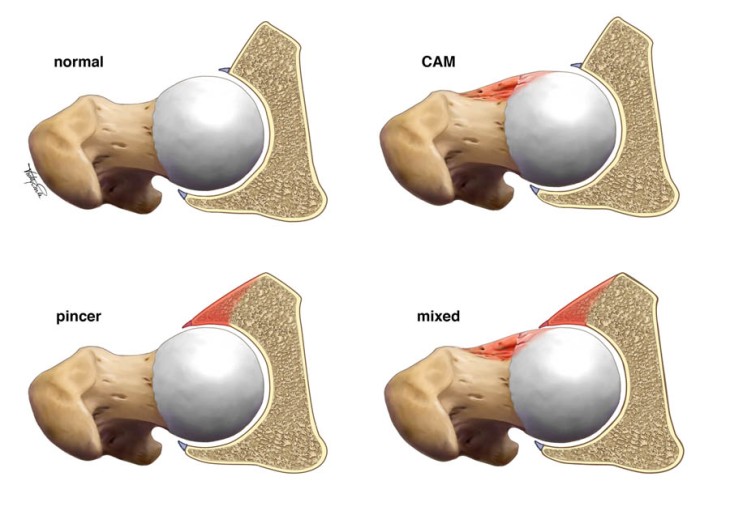You’ve just spent 70 minutes turning this way and that, jumping, landing, twisting, evading your opponent, accelerating, decelerating. Your hips feel stiff and sore afterwards. They always are after tough games such as this one. On the way home in the car and getting out of bed the next morning is a struggle. Throughout the next day is not much better especially when sitting for long periods. Is the weight of playing for club and county beginning to take its toll? This pattern persists so you attend your GP who sends you for x-ray and to see an orthopaedic consultant. He recommends immediate surgery “before it’s too late”. Not exactly the outcome you were after. You sob your way back to the car with your Dad to consider the options. Oh and you are just 16 years old.

FAI
This presentation is not uncommon. FAI, not the Football Association of Ireland but Femoral Acetabular Impingement (which is becoming just as controversial a topic in the media) is defined as a symptomatic premature contact of the head of the femur (thigh bone) and the acetablum (socket). More and more adolescents and young adults are complaining of hip pain, many left with choices to make like whether or not to operate early or give up the sport they love. It has been attributed to increasing intensity and volume of training with most of the damage being accumulated during adolescent years, although symptoms usually only becoming obvious later into their 20’s. The sport is usually multi directional in nature such as rugby or football. It is thought that the repetitive nature of such sports involving constant twisting and turning on the hip during adolescent years causes stress around the developing joint. But connective tissue, joints and articular cartilage are able to withstand loading – it is exactly what they are designed to do – be robust. But if the timing of the next loading phase is too soon, i.e. before adequate recovery has been allocated to the tissue, the result can be some deformity to the structure, particularly in the young growing hip that may not be moving optimally.
Can surgery help?
The idea of surgical intervention is to “clean up” areas that may be restricting range of movement through ‘impingement’ and hence causing symptoms of pain. So it sounds straight forward right? No. In fact outcomes following surgery are poor. Really poor. This is mainly due to the failure in addressing the underlying mechanical cause of the problem, i.e. how the athlete is turning or how they are landing, but also the volume of the training being undertaken with inadequate recovery before the next session. On analysis of how an athlete will land they will often present with instability around the lumbo pelvic area. This will cause a dipping down of the pelvis on one side and the hip and thigh bone to rotate inwards on impact. This changes the normal force being distributed about not just the hip joint but the entire lower limb. Instead of the force being evenly distributed around the joint, a certain section of it takes most the load when the joint pivots in the socket. As this is a repetitive movement during a game, it ends up that this same section of the joint takes most of the load over and over again.
Treatment and Management
The 2016 Warwick Agreement on FAI has brought clarity to some of the uncertainties around the issue. Educating the patient about the issue and activity modification should be the starting point. A greater understanding of what is happening will help when correcting any abnormal movement patterns. Through a series of mobility exercises to the hip, stability exercises to the pelvis and strengthening exercises around the hip and knee we can begin to see more control with how the athlete moves. If at this point symptoms persist it may be time to consider more invasive options such as surgery. But have you wasted any time trying the less invasive options of rehab? Absolutely not. In fact the rehab will be the likely reason the surgery will succeed.
If you are concerned that you or your child may have FAI talk to your Chartered Physiotherapist. They will be just as keen to avoid surgery as you are and put steps in place to get you moving better.
For more information on any of the issues addressed throughout this article please contact Rob via email at mccabephysiotherapy@gmail.com, Twitter @mccabephysio, Facebook at McCabe Physiotherapy or visit http://www.mccabephysiotherapy.com
Rob McCabe MISCP
Chartered Physiotherapist
MSc (pre reg) Physiotherapy, BSc Sport Science and Health, MSc Sports Physiotherapy, PG Dip Orthopaedic Medicine
Orchard House, Moorefield Rd, Newbridge, Co. Kildare

One thought on “Nothing ‘Hip’ about FAI”